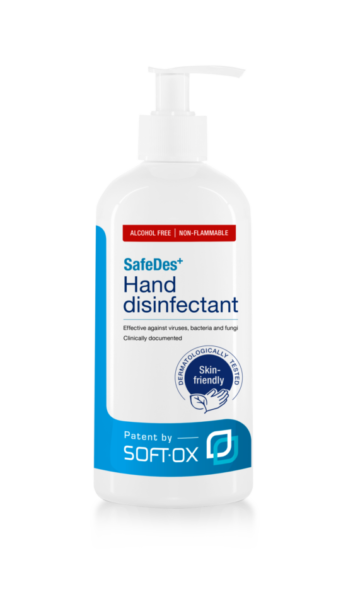SafeDes+ Hand Disinfectant is a highly effective and clinically documented product that is safe, well tolerated and non-drying on both healthy and compromised skin. SafeDes+ is highly effective against all relevant microbes, and has been thoroughly tested and documented in accordance with EN-tests EN13727, EN1500, EN13624 and EN14476. Importantly, SafeDes+ has documented full virucidal effect on both naked and enveloped viruses (e.g. coronaviruses, influenza virus, norovirus, and others). Enveloped viruses, such as corona (SARS-CoV-2) are inactivated after only 15 seconds of application with SafeDes+.

Product Details
- Product Name : SafeDes+ Hand Disinfectant
- Patented by : SoftOx Solutions AS
- Classification : PT1 & PT2
- Status : Launched in the Norwegian market
- Developed and Produced : In the Nordics
- Where to buy SafeDes+ Patent by SoftOx
Excellent tolerability safety – the benefits of research
The formulation has been thoroughly tested in pre-clinical biocompatibility studies as well as clinical trials documenting its excellent safety and tolerability profile. Even in situations of breached or compromised skin, e.g. often experienced by healthcare workers, SafeDes+ does not sting, burn, or dry out the skin, making it an ideal alternative to alcohol-based handrubs. Importantly, the SafeDes+ formula does not induce antimicrobial resistance. The use of SafeDes+ can help prevent and reduce hand eczema and irritated skin among healthcare workers, increase hand hygiene compliance, and reduce hospital acquired infections and antimicrobial resistance.
The product is not classified as dangerous according to the CLP regulation (EC) No. 1272/2008, apart from potentially being corrosive on metals. Use biocides safely. Always read the label and product information before use.
Scientific publications
Purpose:
The aim of the present study was to examine the skin barrier response to ACHD compared with ABHR on intact skin and on skin with experimentally induced irritant contact dermatitis in healthy individuals, respectively.
Results:
In both studies, the skin barrier function was unaffected after repetitive exposure to ACHD and ABHR, and with no significant differences between the products. Subjective discomfort was reported as sporadic or very mild in relation to both products.
